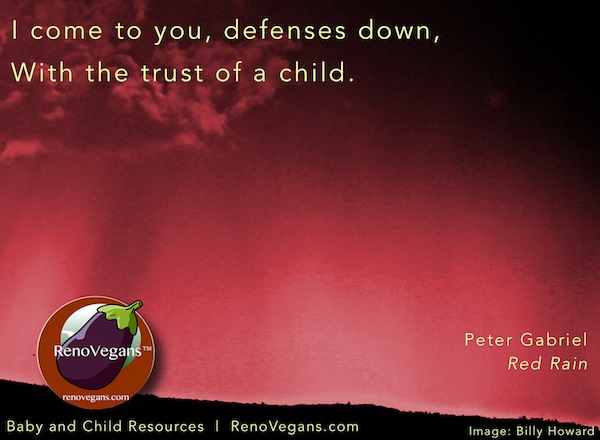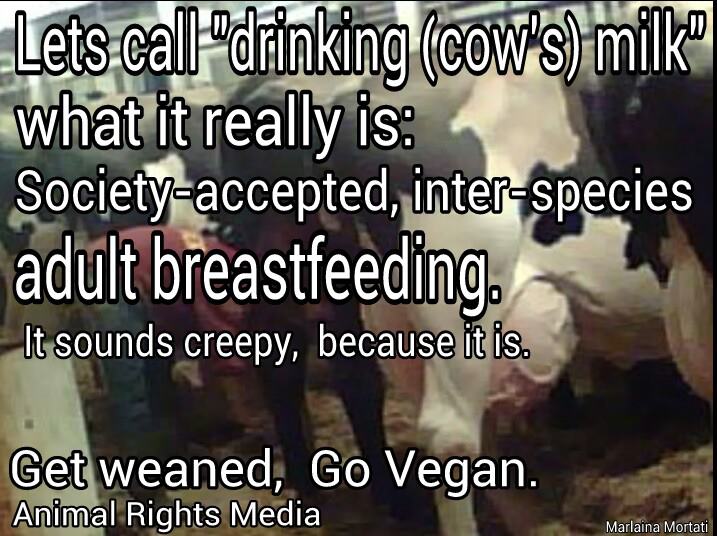Vegan Baby
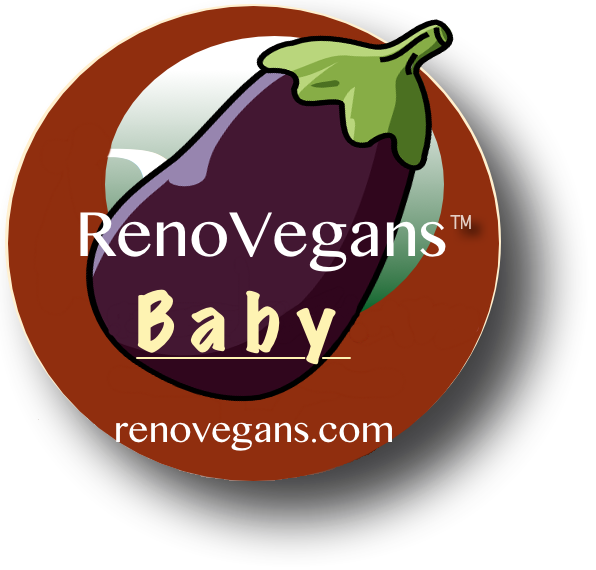
 For each animal to drink the milk of its kind is beneficial, but if drinking milk of different species, is harmful.
For each animal to drink the milk of its kind is beneficial, but if drinking milk of different species, is harmful.
—Hippocrates
** Before taking on a vegan approach to pregancy and infant and child-rearing, consult your doctor for medical advice. **
 In this section we'll address a healthy vegan diet for your baby as well as vegan options for other products that will reduce the environmental impact your baby will have on the planet. After all, being vegan is not only what we eat, it's also about reducing our footprint on our overburdened planet. Whatever products you choose, do a little research and make sure that the company (or parent company) does not test any of their products on research lab animals.
In this section we'll address a healthy vegan diet for your baby as well as vegan options for other products that will reduce the environmental impact your baby will have on the planet. After all, being vegan is not only what we eat, it's also about reducing our footprint on our overburdened planet. Whatever products you choose, do a little research and make sure that the company (or parent company) does not test any of their products on research lab animals.
This section is still in the "infancy" stage (pardon the pun!) and we'll add content as we have time to work on it. Have ideas or thoughts to add? Just Email us!
Diapers And other helpful baby bum items
Diapers
Diaper Fact: In the year 2500, early 21st-century disposable diapers will finish biodegrading.
When it comes to diapers, cloth diapers are the obvious choice for the environment. Disposable diapers constitute for over 2% of municipal waste. Regardless, you may still choose to use disposable. Whatever your choice, make sure you consider the impact diaper usage will have on the environment for years to come. Yes, we all know cloth diapers are messy but there are alternatives. Check your local resources for diaper services in your area. These services make using cloth diapers more practical for busy moms and is generally cheaper than using disposable.
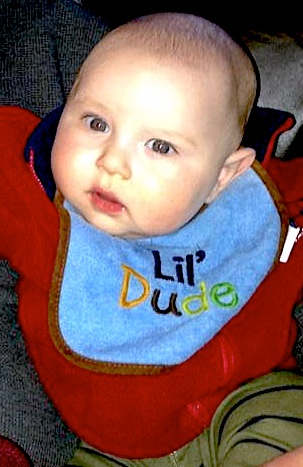 Cloth Diapers - Green Mountain Diapers, based in Vermont, uses NO color dye in the cotton fabrics that touch the baby's skin. You can find organic and chlorine free products here. Be sure to check out their Growing Greens diapers made from the highest quality eco-friendly organic fibers made right here in the USA. Not all of their products are vegan so reading the full description of each product will be helpful in creating your wish list. Their gift registry makes it easy for friends and family to purchase the exact items you want so you aren't receiving useless gifts.
Cloth Diapers - Green Mountain Diapers, based in Vermont, uses NO color dye in the cotton fabrics that touch the baby's skin. You can find organic and chlorine free products here. Be sure to check out their Growing Greens diapers made from the highest quality eco-friendly organic fibers made right here in the USA. Not all of their products are vegan so reading the full description of each product will be helpful in creating your wish list. Their gift registry makes it easy for friends and family to purchase the exact items you want so you aren't receiving useless gifts.
Eco-Friendly Disposable Diapers - Information coming soon!
Wipes
Of course, commercially made disposable wipes are cheap and convenient but not only are they bad for the environment, they aren't good for your baby's skin. Most disposable wipes contain alcohol as well as chemicals. Look for an ingredient called lanolin; this is derived from wool and the skin of slaughtered animals.
The "old school" way of diaper changing removes most of the waste by wiping the baby's bottom with the front inside of the diaper. Any remaining waste can be wiped up with a warm wash cloth. While this is convenient for home use, it's not always practical away from home. For short outings, just put a damp washcloth in a sealed container. Even if you are using a disposable wipe for longer trips, using a washcloth at home will still greatly reduce unnecessary trash. That being said, there are disposable vegan options available to you when you absolutely need to use them. One might argue that these vegan options cost more than commercially made products. While that may be true, you should be saving money by making your own homemade baby food so your savings from that will be well spent on products that are good for your baby, the animals and the environment. So, if you opt for disposable, do your research and start with one of these ideas.
Fill Your Pants | Healthquest

"For each animal to drink the milk of its kind is beneficial, but if drinking milk of different species, is harmful." —Hippocrates
Non GMO Baby Food Shopping Guide
Articles
 For each animal to drink the milk of its kind is beneficial, but if drinking milk of different species, is harmful.
For each animal to drink the milk of its kind is beneficial, but if drinking milk of different species, is harmful.
—Hippocrates
 In this section we'll address a healthy vegan diet for your baby as well as vegan options for other products that will reduce the environmental impact your baby will have on the planet. After all, being vegan is not only what we eat, it's also about reducing our footprint on our overburdened planet. Whatever products you choose, do a little research and make sure that the company (or parent company) does not test any of their products on research lab animals.
In this section we'll address a healthy vegan diet for your baby as well as vegan options for other products that will reduce the environmental impact your baby will have on the planet. After all, being vegan is not only what we eat, it's also about reducing our footprint on our overburdened planet. Whatever products you choose, do a little research and make sure that the company (or parent company) does not test any of their products on research lab animals.
This section is still in the "infancy" stage (pardon the pun!) and we'll add content as we have time to work on it. Have ideas or thoughts to add? Just Email us!
Diapers And other helpful baby bum items
Diapers
Diaper Fact: In the year 2500, early 21st-century disposable diapers will finish biodegrading.
When it comes to diapers, cloth diapers are the obvious choice for the environment. Disposable diapers constitute for over 2% of municipal waste. Regardless, you may still choose to use disposable. Whatever your choice, make sure you consider the impact diaper usage will have on the environment for years to come. Yes, we all know cloth diapers are messy but there are alternatives. Check your local resources for diaper services in your area. These services make using cloth diapers more practical for busy moms and is generally cheaper than using disposable.
 Cloth Diapers - Green Mountain Diapers, based in Vermont, uses NO color dye in the cotton fabrics that touch the baby's skin. You can find organic and chlorine free products here. Be sure to check out their Growing Greens diapers made from the highest quality eco-friendly organic fibers made right here in the USA. Not all of their products are vegan so reading the full description of each product will be helpful in creating your wish list. Their gift registry makes it easy for friends and family to purchase the exact items you want so you aren't receiving useless gifts.
Cloth Diapers - Green Mountain Diapers, based in Vermont, uses NO color dye in the cotton fabrics that touch the baby's skin. You can find organic and chlorine free products here. Be sure to check out their Growing Greens diapers made from the highest quality eco-friendly organic fibers made right here in the USA. Not all of their products are vegan so reading the full description of each product will be helpful in creating your wish list. Their gift registry makes it easy for friends and family to purchase the exact items you want so you aren't receiving useless gifts.
Eco-Friendly Disposable Diapers - Information coming soon!
Wipes
Of course, commercially made disposable wipes are cheap and convenient but not only are they bad for the environment, they aren't good for your baby's skin. Most disposable wipes contain alcohol as well as chemicals. Look for an ingredient called lanolin; this is derived from wool and the skin of slaughtered animals.
The "old school" way of diaper changing removes most of the waste by wiping the baby's bottom with the front inside of the diaper. Any remaining waste can be wiped up with a warm wash cloth. While this is convenient for home use, it's not always practical away from home. For short outings, just put a damp washcloth in a sealed container. Even if you are using a disposable wipe for longer trips, using a washcloth at home will still greatly reduce unnecessary trash. That being said, there are disposable vegan options available to you when you absolutely need to use them. One might argue that these vegan options cost more than commercially made products. While that may be true, you should be saving money by making your own homemade baby food so your savings from that will be well spent on products that are good for your baby, the animals and the environment. So, if you opt for disposable, do your research and start with one of these ideas.

"For each animal to drink the milk of its kind is beneficial, but if drinking milk of different species, is harmful." —Hippocrates
Non GMO Baby Food Shopping Guide
Milk or soy protein is the basis of most infant formulas. The secret ingredients in these products are often soy, or milk from cows injected with rbGH. Many brands also add GMO-derived corn syrup, corn syrup solids, or soy lecithin.
List of alternative baby foods rated by the Non-GMO Project.
Articles
-
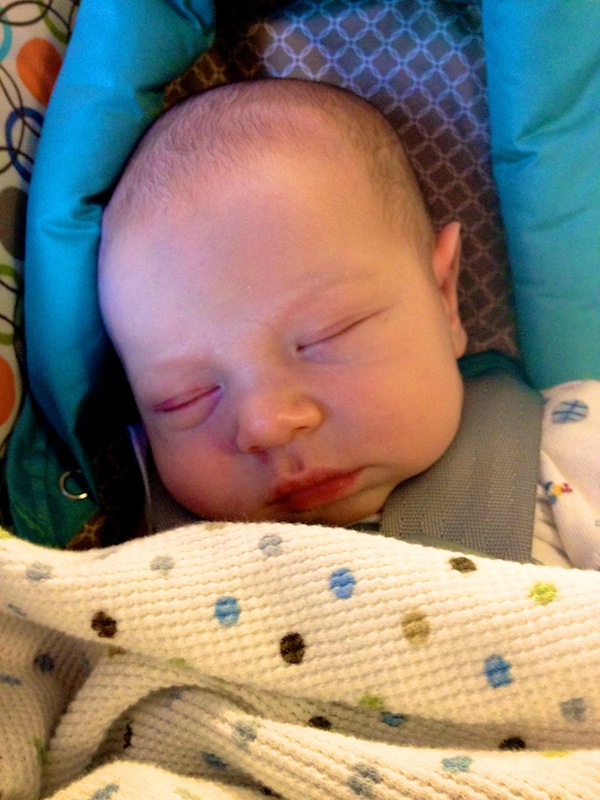 Should you give up being vegan when pregnant?
Should you give up being vegan when pregnant?
Actor Natalie Portman recently announced that she had relinquished veganism during her pregnancy to satisfy cravings for non-vegan foods. Is adhering to veganism in the face of strong pregnancy cravings impossible? Alison Waters, who has had three vegan pregnancies, argues that it isn't -- and that pregnancy is, in fact, an optimal time for vegans to stick with it. More…
-
Bringing Up a Baby, The Vegan Society
Avoid all baby foods that contain sugar or artificial sweeteners. Sugar contains no vitamins, minerals or protein and can lead to obesity, both now and later in the child's life. Sweetened foods also confuse and seduce the appetite tending to satisfy hunger quickly and displace healthful foods. Do not add salt to foods.
Around 7 months of age baby should now be ready for well-cooked wholegrain cereals such as pureed lentils, rice, lima beans and weetabix. These foods should be mushy in consistency. If the family has a history of wheat, soya or corn allergies, start with rice or oat cereals. A small amount of mashed banana or breast milk can be added to the cooked cereal for easy introduction. More… -
 Raising a Vegan Baby: The First Year, PeTA,
Raising a Vegan Baby: The First Year, PeTA,
Doctors recommend breastfeeding infants, and yep, breast milk is vegan. If you can't breastfeed or choose not to, you can try to score breast milk from a vegan donor by going through an approved milk bank, or you can go the soy formula route. The vitamins in soy formula may contain trace amounts of animal products, but you can check with the manufacturer and decide what is best for your family.
A baby's first foods are typically fruits, veggies, and rice cereal—all of which are naturally vegan. Once your baby is ready for small pieces of food instead of having everything pureed, you can introduce proteins such as tofu, tempeh, and soft cooked beans, and there's no need for meat! Just remember to feed your baby, vegan or not, a wide variety of foods and a balanced diet. More… -
Vegan Babies and Toddlers, VegFamily
From breastfeeding to solids, and "ga-ga" to "Mommy, why does grandma eat animals?" we've got you covered. And there's a lot to know and prepare for. How do you raise a healthy, vegan baby and toddler?
This page is a long list of links to great baby products and ideas, including these ideas:
Making Baby's Food at Home
If you are interested in making a HUGE dent in this baby budget line item, we recommend you make your own baby food. Now don't laugh, roll your eyes or start trembling at the thought of cooking - most people find it surprisingly simple and quick to make baby food.
Homemade baby food will cost less than $100, saving your family up to a whopping $500! And before you say" but who has the time", think about using the tried n' true ice cube tray method of making baby food. It will take only 30 minutes per week! There are not many things you can do in 30 minutes a week to save hundreds of dollars.
Here are the four basic steps to making baby food:
 Step 1: Start with fresh fruits or vegetables. Depending on the type of food, you will need to wash, chop, and peel the fruits and vegetables. If you are using frozen produce, simply open the package.
Step 1: Start with fresh fruits or vegetables. Depending on the type of food, you will need to wash, chop, and peel the fruits and vegetables. If you are using frozen produce, simply open the package.
Step 2: Cook the food in the microwave or steam the food on the stove. Foods are done when the can be pierced or mashed easily with a fork.
Step 3: Pour the food and cooking juices into a food processor or a blender and puree to a soft and velvety texture. You may need to add water to get the right texture.
Step 4: Spoon the food puree into ice cube trays. Cover and place them in the freezer. When frozen, pop the baby food cubes out into a freezer storage bag. Baby food cubes stay fresh for up to two months in the freezer.
When it comes time to feed your baby, simply select baby food cubes from the freezer, defrost and the rest is YUM! More…
Vegan Babies: A New Trend? Huffington Post, 11/11.
Hollywood stars taking up veganism is nothing new: plenty of celebs -- Jessica Simpson and Olivia Wilde among them -- value forgoing animal products in favor of a plant-based diet. Last January, even our former cheeseburger-loving president, Bill Clinton, jumped on the bandwagon as a health precaution.
But vegan babies? Yes. Alicia Silverstone has been raising her three-month-old baby, Bear Blu, on a strictly vegan diet. And they're not just in Hollywood: Many parents are raising their children on a meat, fish, dairy and yes, even honey-free diet (don't forget about those bees).
"To raise our kids vegan was never really a question," said Caity McCardell, 43, a mom of two and blogger who lives in Oceano, Calif. McCardell and her husband have raised their daughter and son vegan since they were born (the children are now 6 and 8-years-old). More…
Resources
-
Vegan Parenting Blog By Suzanne in Reno. Coming soon!
Growin Up Veg, Vegan Parenting Blogs and Resources.

